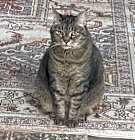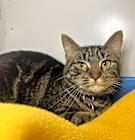LaPerm cats come in a wide variety of solid colors, including white, black, blue, red, cream, chocolate, cinnamon, and fawn. LaPerms can also have other tabby markings, bi-color patterns, tabby, tortoiseshells, and combinations of these.
LaPerm
Breed Type: Western
Common nicknames: Dalles LaPerm
Coat: Short-haired, long-haired
Hypoallergenic: Yes, they may not trigger allergies.
Temperament: Friendly, affectionate, sociable, energetic
Life expectancy: 10-15 years
Color & patterns: Calico

The LaPerm is known for their delightfully curly coats, which occurred due to a spontaneous mutation, but it’s not just their fabulous fur that defines them; these cats have lively personalities and are known for their playful and outgoing nature. They’re natural performers, always ready to strut their stuff, entertain with their acrobatic moves, and steal the spotlight with their cheeky charm. LaPerms are fantastic family pets who get along well with children and other pets. If you’re looking for a cat who will make you laugh, the LaPerm could be the perfect pet for you.
LaPerm characteristics
Learn about about LaPerm basics like their fur colors, shedding levels, how much grooming they need, and other LaPerm facts.
Average height
6-10 inches (15.2-25.4cm)
Average weight
6-12 pounds (2.7-5.4 kg)
Average lifespan
10-15 years
Good with other cats
Good with dogs
Affection
Shedding
Health
Exercise needs
When does a LaPerm stop growing?
Similar to other cat breeds, LaPerm cats reach their full size between two and three years old. Some LaPerms might reach their full size sooner or slightly later. Genetics and nutrition can influence growth rates. If you’re concerned about your LaPerm’s growth or weight, consulting a veterinarian is always recommended.
How big do LaPerms get?
Most LaPerms weigh between six to 12 pounds and stand around 6 to 10 inches tall. Males tend to be larger than females.
What eye colors can a LaPerm have?
LaPerm cats can have a stunning range of eye colors, including copper, gold, yellow, green, and blue.
LaPerm history
Learn about where this LaPerm came from!
Where are LaPerm cats from?
LaPerm cats are from the U.S. In 1982, a small, bald kitten was born to a litter of a barn cat in Oregon. Eight weeks later, this kitten acquired a curiously curly coat of hair and had an incredibly affectionate temperament to go along with it. The cherry orchard owner was so impressed with the unique look and personality of the breed that she went on to develop the LaPerm as a breed.
LaPerm temperament
Learn about about the LaPerm temperament and how well they fit into your lifestyle, home environment, and family.
Do LaPerm cats meow a lot?
No, Laperm cats do not meow a lot. They are generally known for being quieter than some other breeds.
Are LaPerm cats friendly?
Yes, LaPerm cats are known for typically being very friendly cats. They are renowned for their loving, affectionate, sweet temperaments. Unlike some cat breeds that can be more independent, LaPerms tend to crave human interaction and attention.
Are LaPerm cats good with other cats?
Yes, LaPerm cats are generally good with other cats. They have a friendly and social temperament, making them adaptable to multi-cat households. LaPerms are known for their affectionate nature and curiosity, which helps them get along with other pets, including cats. Of course, individual personalities can vary, so take introductions slowly.
Are LaPerm cats good with dogs?
Yes, LaPerm cats are usually good with dogs, especially if the dog is well-behaved and cat-friendly. As with any interspecies introduction, it’s important to introduce a LaPerm cat and a dog gradually and in a controlled environment. Initially monitoring their interactions can help ensure that both pets feel safe and comfortable. Positive reinforcement and patience are key to fostering a harmonious relationship between a LaPerm cat and a dog.
Are LaPerm cats good hunters?
Yes, LaPerm cats are good hunters. They originated from a barn cat used to catch mice, so this breed has a natural skill therein. Providing them with plenty of mental and physical stimulation helps channel their hunting instincts in a positive way, ensuring they stay happy and engaged.
Are LaPerm cats good indoor cats?
Yes, LaPerm cats are good indoor cats. For safety reasons, it is recommended that all cats be kept indoors to protect them from hazards they might encounter outside, such as traffic, predators, diseases, and harsh weather conditions.
Are LaPerm cats active?
Yes, LaPerms are active cats. For as affectionate and sweet-tempered as they are, LaPerms love activity — they are quite playful and athletic, and they love a good game of chase and interacting in games with their humans.
Are LaPerm cats good lap-cats?
Yes, LaPerm cats are good lap-cats. They love being pampered, and that includes a warm lap cuddle. They will often seek out attention and enjoy being petted and cuddled. While individual personalities can vary, most LaPerms are not aloof and tend to form strong bonds with their families.
LaPerm health
Learn about about the LaPerm health outlook and what diseases they may be prone to at various stages of their life.
Do LaPerm cats shed?
Yes, LaPerms are light to moderate shedders who tend to shed less than many other breeds. Regular grooming of their wavy coat can help manage their shedding and keep their coat healthy.
Do you need to groom a LaPerm cat?
A weekly brushing will be enough grooming for the low-maintenance LaPerm. In addition to brushing, all cats should have their claws trimmed every two weeks or so. Cats are also prone to periodontal disease and should have their teeth brushed two to three times a week.
Are LaPerm cats hypoallergenic?
Yes, LaPerm cats are considered hypoallergenic. While no cat is truly hypoallergenic, this breed sheds less than other cats and reportedly bothers allergy sufferers less.
Do LaPerms have a lot of health problems?
The LaPerm has a large genetic pool and is the descendant of robust and hardy barn cats, so there are no breed-specific issues to be concerned about. Though any cat can develop some of the more common diseases that affect cats, such as:
Chronic kidney disease (CKD): This is a common condition in cats in which the kidneys gradually lose function over time, leading to issues such as dehydration, weight loss, and increased thirst and urination. It’s often managed through diet, medication, and regular check-ups to maintain quality of life.
Diabetes: This complex disease prevents the body from properly regulating blood sugar levels
Hyperthyroidism: This thyroid malfunction results in an overproduction of thyroid hormone and could cause weight loss, excessive thirst, panting, diarrhea, and obesity.
Gingivitis: This inflammation of the gums can lead to periodontal disease.
Hypertrophic cardiomyopathy (HCM): Certain cats may be prone to this inherited heart issue, a condition where the heart muscles thicken, impacting the heart’s ability to function effectively.
Obesity: Cats have a hearty appetite and are prone to obesity. It is best to give them scheduled feeds and minimal treats.
Find LaPerm kittens near you
Adopting a LaPerm
We don't see any LaPerms available for adoption in your exact location or cities near you, but here are some adorable similar breeds in Columbus, OH.

Vincent
Tabby
Male, adult
Westerville, OH
Good with dogs
Good with cats
House-trained
Spayed or Neutered
Shots are up-to-date

Myrtle
Domestic Shorthair
Female, 8 mos
Columbus, OH
Not good with dogs
Not good with cats

Chloe
Domestic Shorthair
Female, 1 yr 2 mos
Columbus, OH
Not good with dogs
Not good with cats

Winnie
Domestic Shorthair
Female, 1 yr 9 mos
Columbus, OH
Not good with dogs
Not good with cats

Ranger
Domestic Shorthair
Male, 8 yrs 1 mo
Columbus, OH
Not good with dogs
Not good with cats

Storm
Domestic Shorthair
Female, 3 yrs 3 mos
Columbus, OH
Not good with dogs
Not good with cats

Snow Flurry
Domestic Shorthair
Female, 4 yrs 7 mos
Columbus, OH
Not good with dogs
Not good with cats

Momo
Domestic Shorthair
Female, 1 yr 5 mos
Columbus, OH
Not good with dogs
Not good with cats

Vincent
Tabby
Male, adult
Westerville, OH
Good with dogs
Good with cats
House-trained
Spayed or Neutered
Shots are up-to-date

Myrtle
Domestic Shorthair
Female, 8 mos
Columbus, OH
Not good with dogs
Not good with cats

Chloe
Domestic Shorthair
Female, 1 yr 2 mos
Columbus, OH
Not good with dogs
Not good with cats

Winnie
Domestic Shorthair
Female, 1 yr 9 mos
Columbus, OH
Not good with dogs
Not good with cats

Ranger
Domestic Shorthair
Male, 8 yrs 1 mo
Columbus, OH
Not good with dogs
Not good with cats

Storm
Domestic Shorthair
Female, 3 yrs 3 mos
Columbus, OH
Not good with dogs
Not good with cats





